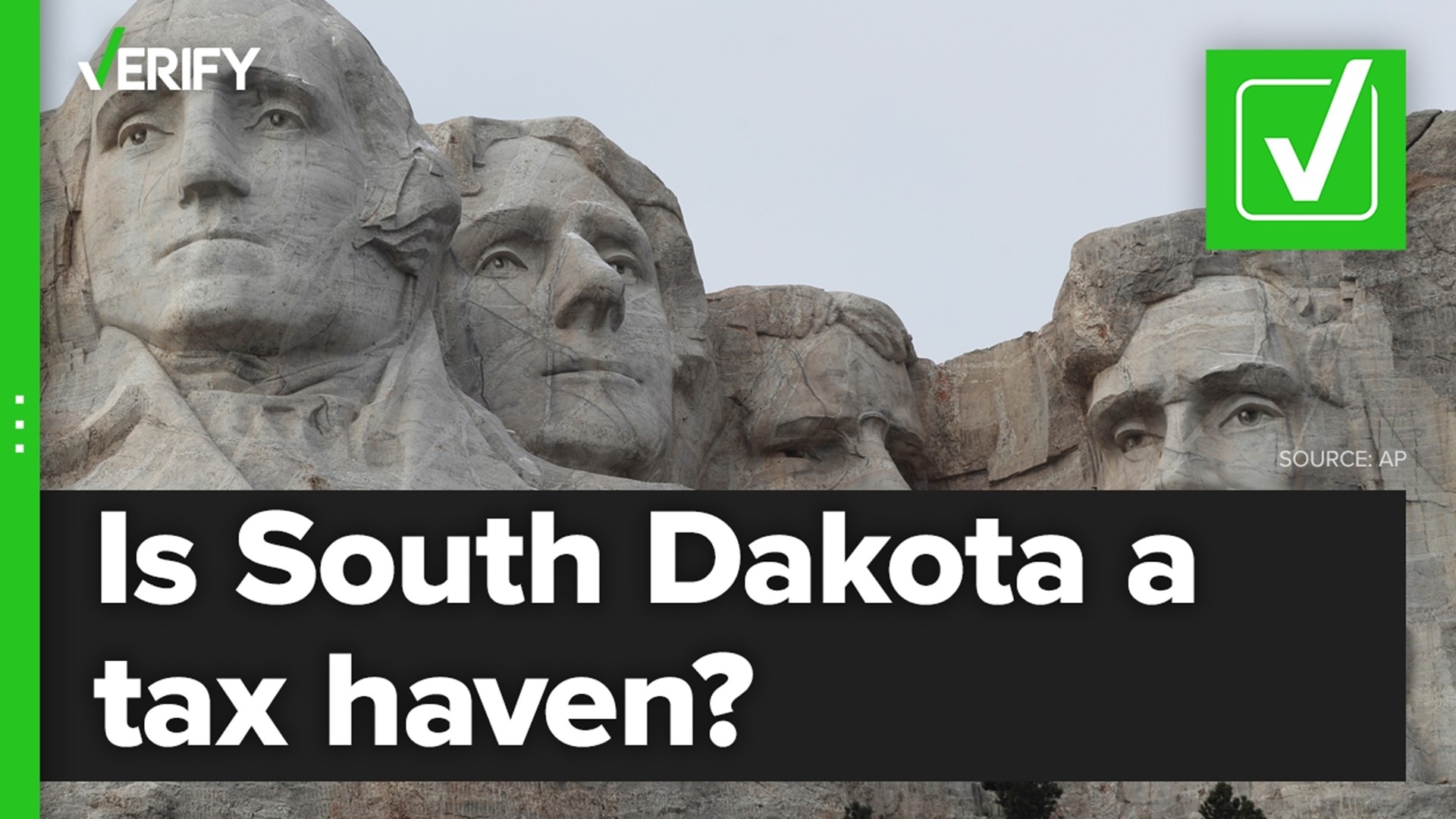The Pandora Papers, a global investigation into the world of offshore finance, shed light on where wealthy individuals, entities and governments are keeping their money around the world. In the U.S., South Dakota was one state identified as a preferred place for the wealthy to stash their assets.
A TikTok video has gone viral with more than 44,000 likes and over 1,400 shares explaining why South Dakota has become a tax haven.
A tax haven is a place where people go to live and companies go to operate in order to avoid paying high taxes.
THE QUESTION
Is South Dakota considered a tax haven?
THE SOURCES
- Michael Heller, Professor of Real Estate Law and Vice Dean of Columbia Law School
- Tom Simmons, Professor of Law at South Dakota University and member of the South Dakota Task Force on Trust Administration Review and Reform
- Rick Kahler, President of Kahler Financial Group in Rapid City, South Dakota
- South Dakota Department of Labor & Regulation
- Internal Revenue Service (IRS)
- South Dakota Legislature Legislative Research Council
THE ANSWER
South Dakota is considered a tax haven, but it’s not the only state - Alaska, Nevada and Delaware also have low state taxes. Tax havens also typically have more extensive asset protection rules and privacy laws, expert Michael Heller told VERIFY.
“The state [South Dakota] has marketed itself for several decades now as the place for very wealthy people to bring their money both for secrecy and for various kinds of trust administration — goodies that they can get if they bring their money there,” he said.
WHAT WE FOUND
Switzerland and the Cayman Islands are the most commonly known international tax havens — places where regulation is low and privacy is high. South Dakota has become a domestic tax haven in the United States because of its own low state taxes, privacy legislation and trust laws.
Michael Heller, professor of real estate law at Columbia Law School, told VERIFY tax havens are not only around for asset protection and privacy, but they are also “responsibility havens.” Trusts can be used to avoid responsibility to pay people you owe money to — former spouses, children, business partners, someone defrauded or someone a person has injured.
“The goal for these trusts these days is not just to avoid taxes, it's also to avoid responsibility. And in that competition, many states are competing in what's called a ‘race to the bottom.’ They're racing to be the worst state from a public policy or collective wellbeing standpoint,” Heller said. Among those states are South Dakota, Nevada, Alaska and Delaware, he said.
Tom Simmons, professor of law at the University of South Dakota, told VERIFY trusts are more like agreements, so there isn’t a paper trail like you might see with corporations or LLCs.
“Unlike LLCs or corporations, they are not publicly recorded with any government entity. This is one of the reasons why they are popular. In the U.S. they are often used in estate planning to avoid probate, which can speed up the distribution of a person’s estate and, unlike a will, keep the recipients of the assets of the estate private and out of public records,” Rick Kahler, a financial advisor and president of Rapid City, South Dakota-based Kahler Financial Group told VERIFY in an email.
“Why, then, has so much money flowed into South Dakota trusts? It’s because South Dakota allows a trust to exist into perpetuity, while other states often limit the life of a trust to as low as 21 years,” Kahler said. “Trusts with no limit on their life are attractive to families who want their wealth to pass from generation to generation.”
Those dynasty trusts, however, do not offer a tax benefit to U.S. citizens.
So who does benefit most from keeping their thousands, millions or billions of dollars in a trust in South Dakota? Non-U.S. citizens.
Kahler said a trust becomes a tax haven “only to non-U.S. citizens if the U.S. tax rates are lower than those of their home country, or if the parties to a trust decide not to report its earnings to their country’s tax authorities.”
“While all U.S. trusts must report trust earnings for U.S. citizens to the IRS, they are not generally required to report earnings to foreign governments. Non-U.S. citizens are responsible for reporting a trust's earnings to their governments. Any criminally intentioned person can use any trust, LLC, or corporation in any state as a ‘haven for dirty money,’” Kahler told VERIFY.
These rules were put in place decades ago, Heller said. Starting with the Foreign Account Tax Compliance Act (FATCA), which requires foreign institutions and other non-financial foreign entities to report on assets held by U.S. account holders, so that even those funds held in foreign accounts, such as in Switzerland or the Cayman Islands, would be subject to withholding.
Countries were then fined through FATCA for hiding money belonging to U.S. citizens, and Heller said after countries realized they were losing revenue, some countries joined together to create the Common Reporting Standard (CRS), which would force countries to exchange information about foreign nationals holding money in their banks.
“But there was one sort of surprising loophole, which is that the U.S. never joined CRS. So the U.S. does not report to foreign countries. There are wealthy people who are hiding money in this country. So FATCA U.S. law says that foreign banks, like Swiss banks, have to report Americans. But American banks won't report foreigners because America didn't join the CRS,” Heller said.
“So what that means is suddenly after the common reporting standard, it became very attractive for foreign hot money to hide in the U.S. Because places like South Dakota, besides offering this extremely advantageous trust for tax avoidance and responsibility avoidance, they also offer the most ruthless secrecy,” he said.

